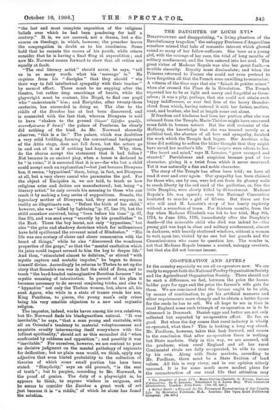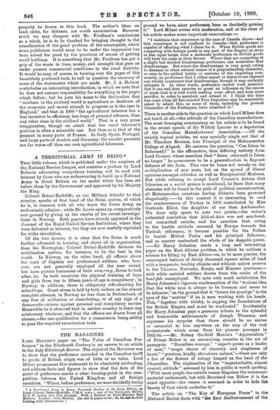CO-OPERATION AND AFTER4
IN the country especially we are all co-operators now. We are ready to support both the National Poultry Organisation Society and the Agricultural Organisation Society. There should not be such a difference, we feel, between the price the house- holder pays for eggs and the price the farmer's wife gets for them. We are convinced that the farmer ought to be able, by means of combination, to get his artificial manures and other requirements more cheaply and to obtain a better figure for the seeds he has to sell. We all hope to see in time in rural England some such triumph of co-operation as is to be witnessed in Denmark. Danish eggs and butter are not only collected but exported by co-operative effort. So far, so good. But when the day comes that rural industry is wholly co-operated, what then ? This is looking a long way ahead. Mr. Fordham, however, takes this look forward, and comes to the conclusion that after co-operation there is nothing but State markets. Only in this way, we are assured, will the producer, when rural England and all her rural Continental rivals are fully co-operated, be able to come by his own. Along with State markets, according to Mr. Fordham, there must be a State fixation of land values. All this is very viewy, and in our opinion utterly unsound. It is for some much more modest plans for the reconstruction of our rural life that attention may * The Daughter of Louis XVI.: Marie-l'herdee-Charlotte de France, Duchess's d'ettlgoule'lne. By G. Leuotre. Tremslated by J. Lewis May. With numerous Illustrations. London: John Lane. [10s. 6d. net.] f Mother Barth: a Proposal for the Permanent Reconstruction of Our Cotvotry Life. By Montague Fordham, ILA. London The Open Road Publishing Company. Pa. zeta properly be drawn to this book. The author's ideas on land clubs, for instance, are worth examination. However much we may disagree with Mr. Fordham's conclusions as a whole, he is to be thanked for bringing thought to the consideration of the great problem of the countryside, which some politicians would seem to be under the impression has been solved for good by the provision of means of getting small holdings. It is something that Mr. Fordham has got a grip of the waste in time, money, and strength that goes on under present commercial conditions in the rural districts. It would be easy, of course, in turning over the pages of this beautifully produced book, to call iu question the accuracy of some of the statements which are made. Mr. J. A. Hobson contributes an interesting introduction, in which we note that be does not assume responsibility for everything in the pages which follow; but he puts his name to the declaration that "nowhere in the civilised world is agriculture so destitute of the economic and moral stimuli to progress as is the case in England," and that in 1908 "the agricultural labourer has a less incentive to efficiency, less hope of personal advance, than any other class in the civilised world." That is a very gross exaggeration, though we admit that the rural labourer's position is often a miserable one. But then so is that of the peasant in many parts of France. In Italy, Spain, Portugal, and large parts of Austria and Germany, the smaller peasants are far worse off than our own agricultural labourers.















































 Previous page
Previous page